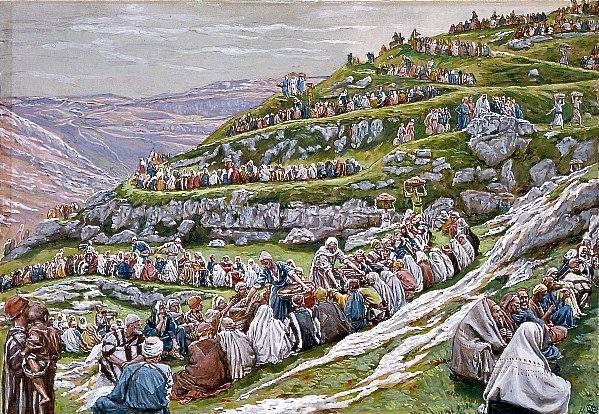For the last few weeks, we’ve been hearing a series of parables from St. Matthew’s gospel: the story of the sower and the seed; the parable of the wheat and the weeds, the stories that have compared the Kingdom of God to a pearl of great price or a treasure in a field.
While each parable has conveyed a different message about salvation, the subtext has been the same: what I called three weeks ago God’s “extravagant generosity.” Each parable in some way has shown how much God wants to give us, how generously He shares Himself and His kingdom.
And now, with the parables concluded, Matthew brings us to this moment, and a “vast crowd” of believers whose lives are changed not by a story, but by an event – a real encounter with Christ that makes the impossible possible.
Last week, I came across a quote on the Facebook page of another deacon, Deacon Jim Casa, from Mount Holly, New Jersey, and it fit this gospel so perfectly. I asked him if I could steal it for my homily this week, and he very generously said, “Go right ahead.” He wasn’t sure where he’d heard it, but I think it fits.
The quote is about spreading the Good News. And it puts it very simply:
“Evangelism,” it said “is all about one really hungry person telling another hungry person, ‘I found the food.’
Surely, that was true for the more than five thousand people gathered on that hillside in Galilee It didn’t rain down on them from heaven, like manna. It came to them very clearly and concretely and for one reason, and for one reason only: because of Jesus Christ.
From that moment on, those thousands would be able to say to every hungry person they met, in wonder and joy: “I found the food.”
And they could point the way to Christ.
But this dramatic episode is about more than eating – and it’s about more than just a flashy miracle.
It is about the transformative power of Jesus Christ. And it is about God’s generosity, the generosity we encountered in the parables, made real.
I’d like us to consider three key ideas.
To begin with: our God is one who heals. The first remarkable event in this passage is mentioned more or less in passing:
“When he disembarked and saw the vast crowd, his heart was moved with pity for them, and he cured their sick.”
In his compassion, his mercy, his love, Christ reaches out to bind our wounds and heal our hurts. He cures those who are sick. He makes us whole. He makes us well. He restores us to what we were meant to be.
Secondly, our God is one who feeds our hungers. And I’m not talking, of course, about just having a ham sandwich. What do we all hunger for? So many of us crave something we can’t really name. Dignity. Peace of mind. Love. Things that are so often elusive. Yet, Christ sees to it that we are fed. He gives us what we need. In fact, he gives us more than what we need, from things we might never have expected. From scraps and leftovers, he creates a feast. From nothing, he gives us everything.
And finally, our God is one who cares about every individual – even the fragments. Nothing, and no one, is wasted. How often have we felt neglected, abandoned, discarded? How often have any of us felt like we were little more than crumbs? But this miracle reminds us: God remembers those who are forgotten. Christ picks up those who are cast aside – the people who fall through the cracks.
Some of you may be familiar with the Jesuit Volunteer Corps: an international group of mostly young people who work full time for justice and peace. It’s a remarkable organization that’s been quietly doing the work of the gospel for nearly 60 years. They work for and with people who are homeless, unemployed, refugees, people with AIDS, the elderly, street youth, abused women and children, the mentally ill and the developmentally disabled. More than 250 grassroots organizations across the world count on Jesuit Volunteers.
This year, the JVC is selling tee shirts to raise money, and I ordered one online. A slogan on the front sums it all up:
“All people matter,” it says. “No one is disposable.”
This gospel reassures us of that. Others may discard us. But God doesn’t.
With that as our hope, and the enduring miracle of God’s extravagant generosity uplifting us, we are filled, and we are healed. We can leave this place tonight changed by our own encounter with Christ in the Eucharist.
We need to share that: the miracle of God’s grace in our lives. Like those loaves and fishes, it’s something that can’t help but be multiplied.
We need to spread that good news which, in fact, is great news. We have come to know the God who heals, the God who cares about the smallest and weakest, and the God who offers us Himself as the Bread of Life.
To all those who hunger, we proclaim this simple message: “I found the food.”
Image: “The Miracle of the Loaves and Fishes” by James Tissot
+++
For more on the Jesuit Volunteer Corps, check out the video below:








